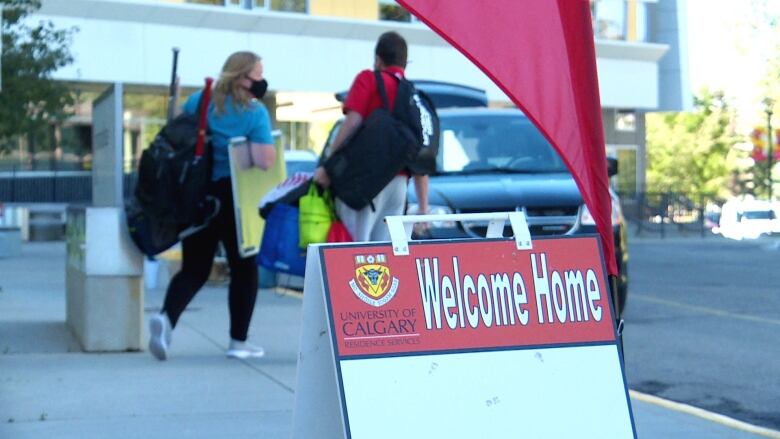What could bring young people to Calgary? The Unconventional Panel weighs in as demographic shrinks
Diminishing population of Alberta's youth subject of upcoming study by Western Economic Diversification Canada

Calgary's population has grown a lot over the past decadebut only one demographic notably dwindled: young adults.
The number of 20- to 24-year olds living in the cityshrank by 4,400between 2009 and 2019, according to the civic census, marking a decline of about 5.5 per cent.
Part of this stems from broader demographic trends notably, a decline in births in the 1990s that was seennationwide. But other Canadian cities haven't seen their ranks of young adults shrink as much as Calgary.
In population estimatesfrom Statistics Canada, Calgary ranked 29thout of 35metropolitan areaswhen it came to the percentage of residents aged 20 to 24 in 2018. A decade earlier, it ranked fifth.
Calgary Economic Developmentand Mount Royal University have tried to figure out why. Western Economic Diversification Canada is also accepting proposals inpreparation ofa study that aims to answer similar questions.
- LISTEN | The Unconventional Panel discusses youth leaving Albertaon the Calgary Eyeopener.
And, on Wednesday, the Calgary Eyeopener put the question to its Unconventional Panel: What is keeping young people from moving to Calgaryand what more can be done to encourage young Calgarians to stay here?
"I think, in conversations and reading tweets and reading articles, a lot of this comes down to this feeling that they don't belong, feeling like there's no future here," said Annalise Klingbeil, 32.
She is the co-founder of Champion Communications, and alsoboth aformer city hall reporter and a formerNDP press secretary.
"[Young people] know that the old days of booming oil and gas, they're not coming back. They value vibrant, walkable, bikeable, transit-friendly neighbourhoods. They believe in climate change and they simply don't see their values reflected in this city and frankly, in this province right now."
The last time we had an oil boom
The provincial government announced a $1.1-billion stimulus program lastJuly that aims to create jobs and support municipalities as part ofAlberta's COVID-19 recovery plan.
It came after the province's unemployment rate doubled from February to May,jumping from 7.2 per cent to 15.5 per cent.
The unemployment rate dropped to 11 per cent by December, but January 2021 has been a bruising month for Alberta's most lucrative industry.
Cenovus Energy, which merged with Husky Energy last October, confirmed Tuesday that it plans to shed about 2,000 jobs the majority of which are expected to hit downtown Calgary.
The news came less than a week after TC Energy announced it was laying off 1,000 workers and halting work on the $1.5 billion Keystone XL pipeline after U.S. President Joe Biden's cancellation of a key permit.
But these aren't entirely fresh wounds for Calgary's economy.
Alberta's petroleum industry hasn't seen its heyday in years, and Klingbeil pointed out that young people are likely envisioning their lives differently.
"An 18-year-old today was, what, in Grade 6, Grade 7, the last time we had an oil boom in the city?" Klingbeil said. "Their future is totally different than the one that I grew up in."
'We have a real problem'
Unconventional panellist Ravin Moorthy, 44, also said thatwhat Calgary has to offer its young people today is very different from when he was in university.
Initially, the engineer had planned to leave Albertato have different experiences however, the work kepthimin Calgary. It was the only place that had jobs, he said.
But the landscape has since changed, and the force that once drew people to Calgary has waned.
It's enough to make him consider deterring his own children from staying.
"To be honest with you, I'm kind of leaning towardencouraging them to leave, and not come back. Like, we have a real problem this city runs the risk of being like Detroit," he said.
"There was a time when we were [called] the Texas of Canada. And I would be so happy if we could follow Texas'lead diversify the economy, encourage a young population base, have some of the best schools."
The golden goose
Layoffs have also occurredoutside of Alberta's petroleum industryin recent years, and they haven't been limited tothe private sector.
Last October, it was announced that between 9,700 and 11,000 employees with Alberta Health Services would be laid off.
School boards laid off hundreds of workers last spring to accommodate budget cuts, and post-secondary institutions laid off thousands.
And Calgary is not prioritizing diversification outside of oil and gas, or valuing education enough, to create work, said Moorthy.
"I think the biggest thing is that there's no opportunities," he said.
"We don't seem to value higher education, investment in technology outside of oil and gas. You know, we don't seem to be moving, socially, in a way that some of the major technology or other industries kind of value.
"And we seem to be just kind of focused on the golden goose, which is still a pretty gold goose. But it's not encouraging people to move here."
The innovation out east
Manjit Minhas, the CEO and co-founder of Minhas Micro Brewery, agreed.
The venture capitalist and Dragons' Den cast member is a born-and-raised Calgarian, and said she has watched the city evolve for 40 years.
Over time, jobs have become hard to come by in Calgary, Minhas said. And careers? Even harder.

The downturn in the market has also suppressed competition. Furthermore, there seems to bean open-mindedness that is missing, or at least a perception of that.
"Even as an employer, I really do believe that over the last decade, we haven't been engaged in this war for talent that the rest of the country really has been engaged in because, well, it has been a depressed job market here," Minhas said.
"We definitely have issues of trying to bring people to the city. And their main concerns are, a lot of the times, diversity. Diversity of people, diversity of thought and opinion, that they feel doesn't exist here in Calgary."
According to Minhas' website, hercompanies had revenues in excess of $220 million in 2020.
But the venture capitalist told the Eyeopener that for the last several years, her investments have trended away from Alberta.
"Most of that innovation is coming out from the far east, or the east. And so unfortunately, that's where a lot of the investment and the innovation is coming from," Minhas said.
"I do think that is fostered young, that is fostered at school, it is fostered at organizations that encourage that. And so young people do look elsewhere, where they can have a community that supports that."
Diversification and conversations
So, what can be done?
Minhas said that in addition to employment opportunities, young people flock to cities for the arts, the culture, the leisure, and those are worthy of investment and development.
"I think that it is something that we do have to look at, as the whole package now not just what industries are here," she said.
Calgary can also simultaneously foster the energy industry while diversifying elsewhere,Moorthy suggested.
"Our energy industry will be here. It'll be here for a long time. But that's no longer the focus," he said.
"We've got to start putting our money and our time into other things so that there's an 'oil and gas' 100 years from now that somebody else can build their future on."
And young people, Klingbeil said, should be given a seat at the table.
"Let's start including them in the conversation. Talk to them about what they believe in, and what they want to see, and what would keep them here," Klingbeil said.
"If we lose kind of that next generation, the ones in junior high and high school right now, that's a really big problem. They're not coming back."
With files from the Calgary Eyeopener and the CBC's Tony Seskus












_(720p).jpg)


 OFFICIAL HD MUSIC VIDEO.jpg)
.jpg)



























































































